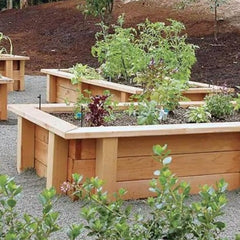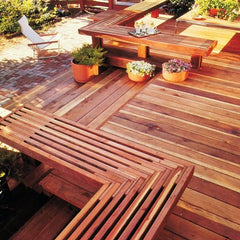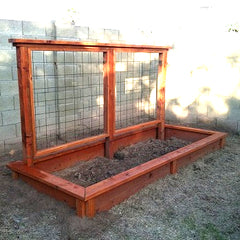Choosing Wood for Your Raised Bed Garden
How to make your decision
What kind of wood should you use for your raised bed gardens? The answer depends on the timeline and style you have planned, along with your budget. If you are gardening as a new hobby in a property you may move away from in the next year, you should probably go with the cheapest and most temporary materials. On the other hand, if you have established a strong passion for gardening and you are confident that you are staying in your home, you may want to invest in the most premium wood choice or even consider stone planters and other options.
Top wood choices: Redwood, Cedar, Douglas Fir
The major acceptable wood types used for gardens are redwood, cedar and Douglas fir.

* Note that in 2023 cedar and redwood have vastly increased in price and we offer those as a premium option to accommodate circumstances
- Untreated redwood is a premium option that has natural resistance to fungus and termites. It is the most expensive wood choice, recommended mainly for its durability and aesthetic qualities.
- Untreated cedar is water and rot resistant but is also relatively expensive. It will last many years and turn from a darker hue to a light grey color over time. This is probably the most common type of wood used by raised bed gardeners.
- Douglas fir is the most affordable of the three common wood selections. This material has an attractive color/texture and does not leach toxins, but it deteriorates more quickly than the premium alternatives.
- After choosing the right wood for your raised bed, apply a thin coat of boiled linseed oil to organically seal the wood, giving it better color and helping it last longer.



What to Avoid
Old pressure-treated wood may contain toxins that leach into soil and compromise the health of your plants. Likewise, railroad ties have usually been treated with creosote that has a similar negative toxic impact on soil. Walnut is another wood type known to be unsuitable for gardens. If you do use a material with unknown toxicity, at least shield your soil partially with a landscape fabric lining to separate the edge of your garden from the wooden borders.
You can avoid these problems completely by using professionals to design, build and install your dream garden. We encourage you to call us at 480-608-1605. We will set up a free consultation and send an expert gardener to your house whenever you have time available. You can discuss your garden ideas and our expert gardener will help you design a first-class garden. You will get free advice, free design help and a free quote. When we install your garden, we include the frame, soil, lining, delivery and installation so you can relax and focus on the fun part.